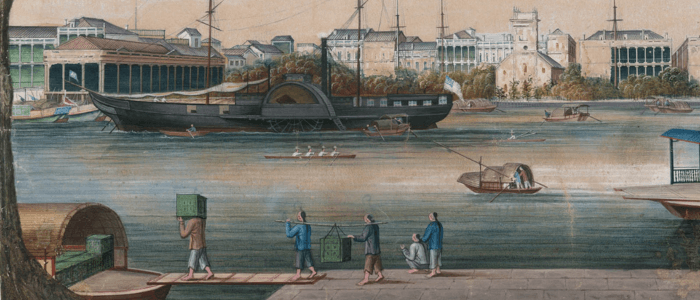Boston to Guangzhou & Back: Perspectives & Legacy of the U.S.-China Trade, 1790-1850s

MHS Event
This is an in-person event at the Forbes House Museum, Milton, Massachusetts. The cost to attend is $25 and includes breakfast and lunch.
The newly independent United States began trade with China in 1784. U.S. consumers craved Chinese products such as tea, porcelain, and silk. To meet high demand, merchants in Boston and Salem traded silver, ginseng, and furs. Later, they illegally brought opium into China.
Join us to explore the history of China-U.S. trade through a local lens, starting with the Early U.S. Republic and running through the Opium Wars. We will tour the Forbes House Museum and model their place-based school programming for grade 5-12 students. We will explore primary source sets with documents, artifacts, and illustrations that explore multiple Chinese and U.S. perspectives on the benefits of trade and its ramifications. Finally, we will discuss the impact and legacy of the opium trade: for Chinese society, for China-US relations, and for the Boston merchants who profited from it.
This workshop is presented by the Massachusetts Historical Society, the Forbes House Museum, and the Five College Center for East Asian Studies. The first 20 teachers to register will receive a rebate to cover the $25 workshop cost on the condition that the registrant attends the workshop. The rebates will be given out after the workshop and are provided by the Five College Center for East Asian Studies.
If you have any questions, please email us at education@masshist.org.
Participants can earn 22.5 PDPs, or 1 graduate credit with Worcester State University (for an additional fee of $125) upon completing the in-person workshop and associated coursework. The Massachusetts Historical Society is a certified Professional Development Provider for the Investigating History curriculum.
This event will take place in person and will be presented in English. ASL translation is available upon request in our post-registration survey (please place requests by 2/3/25). The main level of the museum and the primary workshop space is accessible via a lift from the parking lot. There will be a brief building tour during the workshop, which includes spaces only accessible by a spiral staircase: for participants unable to use the stairs, we offer a narrated slide show.
